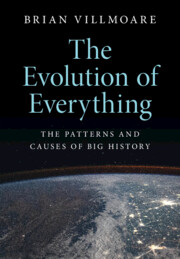Book contents
- The Evolution of Everything
- The Evolution of Everything
- Copyright page
- Contents
- Figure Credits
- Acknowledgments
- Chapter 1: Introduction
- Part I Introduction to the Scientific Perspective on the Past
- Chapter 2: The Origins of the Universe
- Chapter 3: The Structure and History of the Earth
- Chapter 4: Life
- Chapter 5: Evolution
- Chapter 6: Genetics
- Chapter 7: The Evolution of Complex Life
- Chapter 8: The Cambrian Explosion
- Chapter 9: Fish and Land Animals
- Chapter 10: Protohumans
- Chapter 11: The Genus Homo
- Chapter 12: Human Variation
- Chapter 13: Evolution and Human Behavior
- Chapter 14: Brain Evolution
- Chapter 15: Chaos and Complexity
- Part II Science and History
- Additional Readings
- Index
Chapter 15: - Chaos and Complexity
from Part I - Introduction to the Scientific Perspective on the Past
Published online by Cambridge University Press: 03 November 2022
- The Evolution of Everything
- The Evolution of Everything
- Copyright page
- Contents
- Figure Credits
- Acknowledgments
- Chapter 1: Introduction
- Part I Introduction to the Scientific Perspective on the Past
- Chapter 2: The Origins of the Universe
- Chapter 3: The Structure and History of the Earth
- Chapter 4: Life
- Chapter 5: Evolution
- Chapter 6: Genetics
- Chapter 7: The Evolution of Complex Life
- Chapter 8: The Cambrian Explosion
- Chapter 9: Fish and Land Animals
- Chapter 10: Protohumans
- Chapter 11: The Genus Homo
- Chapter 12: Human Variation
- Chapter 13: Evolution and Human Behavior
- Chapter 14: Brain Evolution
- Chapter 15: Chaos and Complexity
- Part II Science and History
- Additional Readings
- Index
Summary
Chaos and complexity are related concepts that help explain patterns in nature, and the inherent limitations we face in trying to interpret them. This chapter is a relatively straightforward examination of these two fields, but it applies them specifically to the biological sciences, demonstrating the constraints on prediction and inference in biological systems, especially evolutionary systems, based on chaos theory. Complexity theory explains how nature can create complex functioning systems, whether they are anatomical or behavioral, and reveals how we can get something as complex as the eye, or consciousness, as an emergent property of a complex system following simple biological or physical rules. The ways in which emergent properties can be contrasted to engineered solutions are emphasized.
Keywords
Information
- Type
- Chapter
- Information
- The Evolution of EverythingThe Patterns and Causes of Big History, pp. 208 - 220Publisher: Cambridge University PressPrint publication year: 2022
